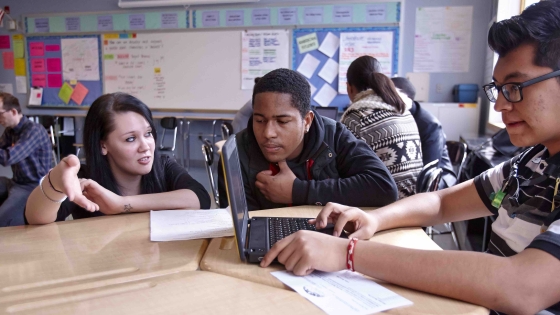About College-Community Connections (CCC)
The Teagle Foundation’s College-Community Connections (CCC) program aims to help financially disadvantaged high school students overcome the barriers they face in pursuing an undergraduate degree. These include structural barriers to college knowledge and advanced course-taking, as well as limited opportunities to develop a strong college-going identity.
CCC funds partnerships between NYC community-based organizations and nearby universities. The partnerships work to improve students’ college knowledge; expose them to rigorous, college-level instruction in the liberal arts; and provide them with opportunities to experience life in a residential college setting.
The organizations that comprise the CCC partnerships represent a broad range of both CBOs and colleges. They vary widely in size, and serve students ranging from 9th through 12th grade. CCC partnerships are united by their use of two particular strategies: (1) building students’ personal connections to institutions of higher learning, and (2) enabling participation in rigorous college-level academic programming. Visit the Teagle Foundation’s website for a list of current and past CCC grantees.
About this Project
The Teagle Foundation has engaged the Research Alliance as a technical adviser for the College-Community Connections program. The goal of this work is to ensure that CCC is effectively supporting partnerships between CBOs and universities that are advancing the Foundation’s goals.
The project began with an “evaluability assessment”—a process designed to determine a program’s potential for a rigorous evaluation, and to provide recommendations for how to prepare for a successful evaluation in the future. To inform this work, Research Alliance conducted a comprehensive review of promising practices for improving college access and success, interviews with Teagle Foundation staff, and a series of observations and interviews with currently participating CCC partnerships. The evaluability assessment:
- Provided recommendations for designing the next round of applications for the CCC program;
- Identified programmatic requirements for partnerships that participate in CCC, with a focus on research-based strategies most likely to effect the outcomes prioritized by the Foundation;
- Shared feedback with current participating partnerships, designed to illuminate how strongly they are emphasizing the objectives of the CCC program; and
- Assisted with laying the groundwork for a future Teagle Foundation evaluation of the CCC program.
The Research Alliance is now working with Teagle to apply lessons from the evaluability assessment to develop and pilot a set of data collection instruments and processes for an internal evaluation of the CCC program. The instruments will focus on collecting student-level data in three key areas of student development: knowledge and credentials for college access, social and personal identity as a college-going student, and skills and practices for college success.
At the same time, to learn more about student experiences within the CCC programs, the Research Alliance will study how student writing develops over time in two participating partnerships. This study will draw on a series of classroom observations, interviews with staff and participating students, and analysis of student writing assignments.
Supported by the Teagle Foundation.


